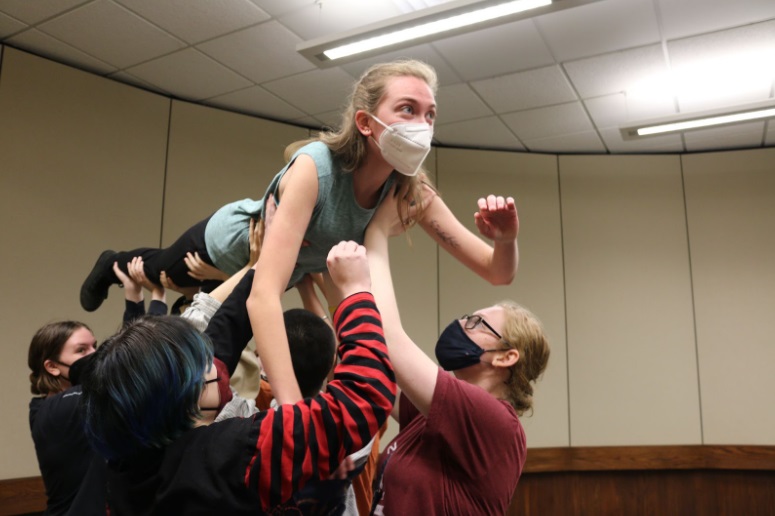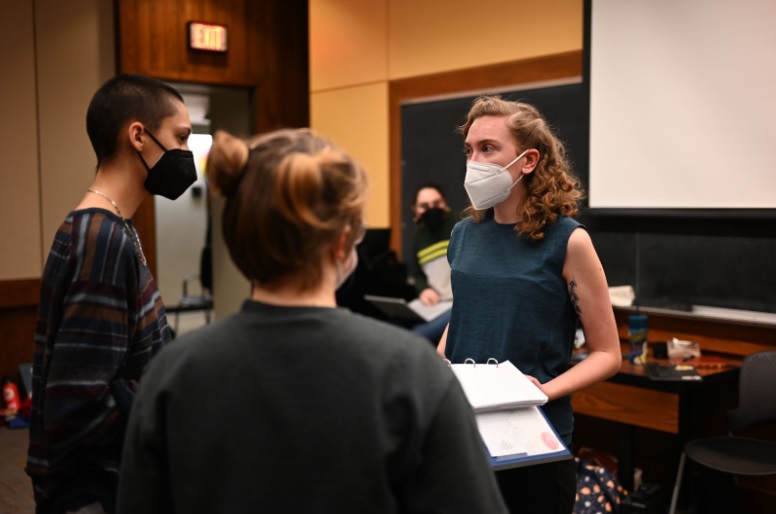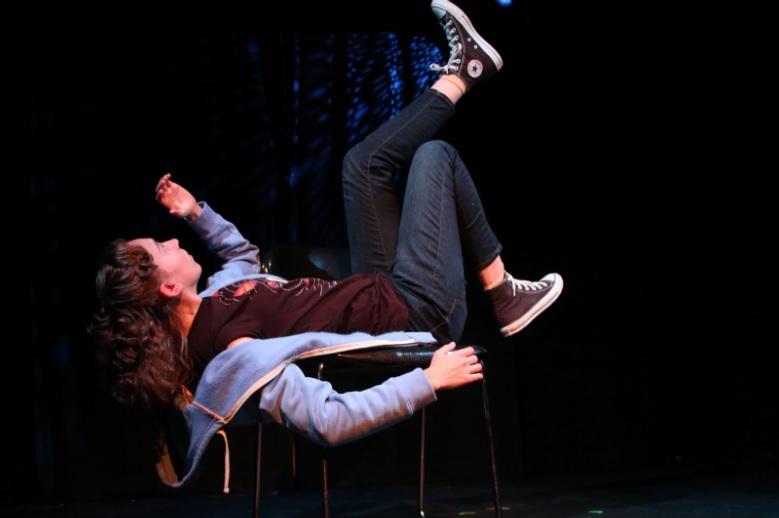UPDATE as of April 20: After the publication of this piece, Mount Holyoke College made the decision to cancel this production. We believe the piece as is stands on its own and can be a practical blueprint for theatres that want to increase their commitment to inclusion and accessibility. Said director Sydney Zarlengo in a statement: “The original point of this production was to show the world that things need to change in theater in regards to accessibility and how to do it. And not only have we done that, but we have also shown how they need to change in so many other ways as well…While the show may be done, we are not, our story is not, and the fight for what is right is not. We are just getting started.”
“The world is full of obvious things which nobody by any chance ever observes.”
― Mark Haddon, The Curious Incident of the Dog in the Night-Time
Sydney Zarlengo introduces themself with many descriptors: “‘I’m a queer, autistic, disabled, non-binary actor-educator-composer.” The 21-year-old theatre-and-psychology major speaks with poise, authenticity, and a passion for creating accessible theatre. This force of nature is currently directing and playing the lead role of Christopher in their college thesis production of The Curious Incident of the Dog in the Night-Time, which is also the first time this oft-produced play is being staged with an entirely all-neurodivergent cast and crew. (It runs April 21-23 at Mount Holyoke’s Rooke Theatre, and the backstage process has been diligently documented since last fall on Instagram.)
Neurodivergent is a term coined by activist Kassiane Asasumasu, defined as “having a brain that functions in ways that diverge significantly from the dominant societal standards of ‘normal.’ For instance, having developmental, intellectual, psychiatric, or learning disabilities.” While this term is often culturally limited to those with autistic spectrum disorder and/or attention-deficit/hyperactivity disorder, Kassiane is adamant about including a wider range of conditions under the neurodivergent umbrella, including dyscalculia, dyslexia, dyspraxia, obsessive-compulsive disorder (OCD), Tourette syndrome, and more.
For Sydney, this production of Curious Incident feels like it has been a lifetime in the making, though the framework for this specific concept began to emerge four years ago. The character of Christopher is not described as autistic in the original 2003 book by Mark Haddon or in the popular stage adaptation by Simon Stephens, which debuted in London in 2012, then came to Broadway in 2014. Still, the character and narrative evolved into a touchstone for members of both the disability and autistic communities.
“The amount of people I know who read that for a summer reading book and then realized they were autistic is, like, half the autistic people I know, including myself,” said Sydney. When they read the book at camp, they recalled realizing, “This is me on a page. Why am I on a page? What is happening?”
When Sydney saw the play’s national tour, they reveled in the chance to see a character they identified with so profoundly, though that joy was overshadowed by the week-long migraine they got as a result of the design choices in director Marianne Elliott’s staging, which Sydney called “the most inaccessible production I have ever seen.”
For Zarlengo, the show’s unpredictable loud sounds, strobe lights, and other production elements, ostensibly designed to evoke for neurotypical audiences the experience of being inside an autistic brain, only detracted from the narrative and contributed to an environment of sensory overwhelm, which is largely incompatible for many neurodivergent potential audience members. In short, the show was alienating the precise audience it was attempting on some level to represent.
There was another issue with the original staging, as many noted that Christopher was cast in London, New York, and on tour only with neurotypical actors. One of the folks sounding the alarm about this was Mickey Rowe, who in 2017 became the first openly autistic actor to play Christopher.
“Sydney is the next generation of autistic and disabled theatremaker,” enthused Rowe, who has become a mentor for Sydney and who has chronicled his own personal experiences in the book Fearlessly Different. “Their production is exactly what the world needs now. I hope that the commercial theatre takes note, and should Broadway or the National Theatre ever choose to revive Curious Incident, I hope they would consider interviewing openly autistic directors.”
Added Rowe, “Disability inclusion is not ‘charity work’. Disabled folks are professional, badass, sexy, and have agency, as Sydney demonstrates with their production. People with disabilities are some of the best creative problem solvers in the whole world. Because we have to be! Disabled people have to be creative problem solvers every single day to navigate a world that wasn’t built for us.”

A second viewing of Curious Incident, in a production that largely repeated the original production’s design choices, got Sydney’s wheels turning, and a friend encouraged them to create their own, more accessible production. Sydney used their lived experience as a theatre student to critique and improve upon traditional theatre classroom, audition, and rehearsal techniques, and also let the emerging field of accessible arts education, paired with their experiences as an educator, guide their choices as a director.
Sydney mentioned that many autistic individuals come into acting classes to find that the skills being taught are ones that they have already taught themselves to survive the unwritten rules of socialization growing up. This is referred to as masking, i.e., hiding instinctual behavior to appear more neurotypical. The framework for Sydney’s production thus became honoring the wealth of knowledge, the different ways of being and moving, and the lived experiences of people in the room. Sydney has prioritized holding the intentionality of accessibility throughout the process. An example: a bag of stim toys is provided at the beginning of rehearsals (stimming refers to self-stimulating behavior, a common trait of neurodivergent individuals). In the publicity for the piece, a visual story is provided to lessen anxiety for ticket holders, showing them images and descriptions of what to expect as an audience member.
The production put out a call for actors in last October, saying that auditions were “open to anybody from any background in the Pioneer Valley area who identifies as neurodivergent and would like to be a part of this groundbreaking project,” with a note adding that they were defining neurodivergence broadly, to include anxiety, depression, PTSD, and other mental illnesses.
Sydney found that people resonated more with the “all-neurodivergent” language than with the show’s title itself. The biggest motivator was wanting to be a part of this historic production.
To counter the inaccessibility of the original staging, Sydney’s design choices “include limited light and projection movement to be more sensitive to people with photosensitivity/processing disorders, blocking the actors to sit whenever they’re not actively needed to be standing, and holding a deliberate awareness to sensory sensitivities in costume design, making sure pieces are not scratchy or uncomfortable so that all cast can do their best work without distraction.”
As that last accommodation makes clear, a lot of what makes this Curious Incident special isn’t just the accessibility for the audience but for its cast and team. Members of that team spoke about the profound joy of being in a collaborative, accessible rehearsal room where their whole selves were welcome.
“This experience has been such an uplifting experience,” said Talia Pott, who plays Voice 3 and others. “I have had both positive and negative theatre experiences in the past, but this is the first one where I really felt I could truly be myself. Knowing that I can show up to rehearsal after a bad day and I will be unequivocally loved, supported, and comforted. This cast is becoming a family, and I truly appreciate everyone for being their authentic, beautiful selves.”
“I love this production because everyone is so nice and we all get along really well and help each other learn,” added Eben, who plays Ed. “We’re figuring out how the show looks as a cast, and it really feels like we all are contributing in various ways to make the show what it needs to be. We have such kinship with each other, and I feel really supported in this environment in a way I haven’t experienced before.”

Added R.A.S. Familant, who plays Voice 1 and others, “In my previous experiences, theatre communities have been exclusionary cliques where people with disabilities like mine are not welcome except as tokens who aren’t taken seriously. We aren’t treated as a part of the group; we’re treated as a pet or a gimmick.” Or still worse, Familant said, “as a liability. People fear they will be accused of discrimination if they don’t include me, but allowing me into a space often reveals just how inaccessible it is—something others would rather ignore than acknowledge. Canes are treated as only acceptable onstage when they’re part of a costume, and not as a mobility aid that the actor actually relies upon. Instead of considering all the ways a cane could be incorporated into choreography, in movement auditions people take one look at my mobility aid and automatically write me out. Theatre is an exclusionary community that often puts on disabilities and other marginalized identities as costumes.”
Enthused co-director Grace MacIntyre, “I don’t think it’s far-fetched to say this show has changed my life,” adding that her “favorite moments with the cast are when they contribute their ideas to the scene…Just because we are all neurodivergent doesn’t mean we all immediately click in terms of personality and communication. Like any group of people, we have moments of confusion and mistakes. But we work hard to make those moments far and few between, because we know very well what it’s like to be misunderstood and misrepresented.”
Producing the show has not been without its challenges: Physical limitations of the performance venue and administrative roadblocks to offering a fully accessible production have provided opportunities for further creative problem-solving. Sydney is also transparent that casting would ideally have been more inclusive, representing a more diverse range of lived experience in the performers.
“The type of neurodivergent that is going to be palatable to pass through an interview for college is a very minute section of that (population),” they conceded. “Our cast is mostly white, mostly late diagnosed, and mostly low-support needs. That’s just how our cast ended up—our representation of neurodiversity is a very small subsection of neurodiversity. We’re trying to be like, ‘Hi, we’re very privileged, but we’re doing something to prove a point to you, and hopefully you guys can pick this up and run with it.’”
In terms of what they want audiences to take way from this Curious Incident, Sydney hopes they feel it on two levels.
“I want them to go, ‘Wow, that was an amazing show, oh my gosh, that was amazing’—not in the sense of, ‘Oh my gosh, disabled people can do things and make art,’ but in the sense of “Wow, that was amazing…Also, all of them were disabled? That’s frying my brain!’ Not in an inspiration porn way—in a good, brain-frying kind of way.”
Sydney and their team hope that others will experience the passion project and be motivated to incorporate some of the practices into their own theatrical work.
“What I’m doing is a big deal, but it really shouldn’t be,” Sydney said emphatically.
Sydney Zarlengo’s staging of The Curious Incident of the Dog in the Night-Time runs April 21-23 at the Rooke Theatre at Mount Holyoke College.
K. Woodzick (they/them) is a theatre artist and journalist currently residing in Northern Wisconsin on Anishinabek land. They hold an MFA in contemporary performance from Naropa University, and their writing has appeared in Theatre Topics and HowlRound. They are the founder of The Non-Binary Monologues Project and produce and host the rebooted Theatrical Mustang podcast, distributed monthly by American Theatre. More at www.woodzick.com.


